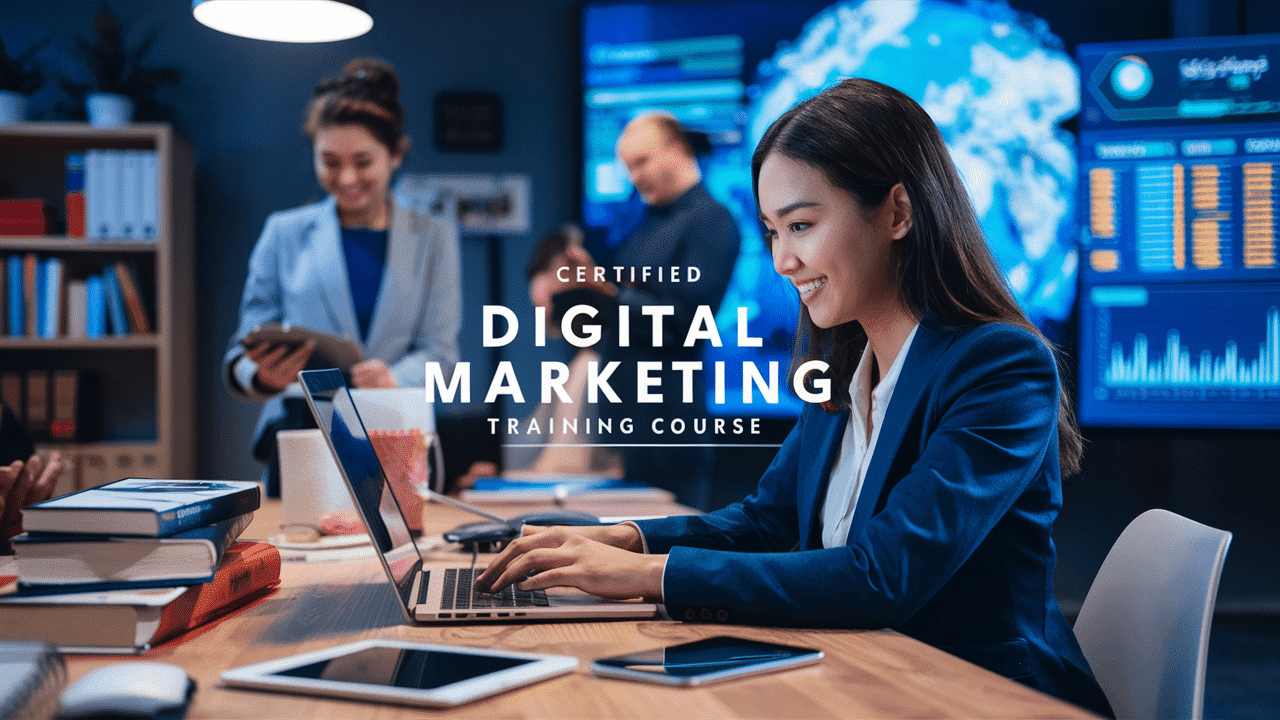World
Class Instructor
1:1 with
Industry Expert
400+
Global Hiring
55%
Avg. Salary Hike
- Overview
- Course Details
- Syllabus
- FAQ
Acquire Key Marketing Skills: Master Digital Marketing, Earn Certification, Launch Your Marketing Career!
Elysium Certified Digital Marketing Training Course offers a comprehensive curriculum designed to equip you with essential digital marketing skills. The course includes Digital Marketing Fundamentals , Local SEO & Global SEO, Market Performance Analysis, Social Media Optimization, and Pay Per Click Expert. Each module is crafted to provide in-depth knowledge and practical expertise. Upon successful completion, you benefit from 100% placement assurance, ensuring you’re well-prepared for a thriving career in digital marketing.
2.2
Version
180 Hours
Duration
45 Hours
Theory
135 Hours
Practical
Version
2.2
Duration
65 Hours
Theory
12 Hours
Practical
65 Hours
- Real-world Digital Marketing Projects
- Personalized coordinator.
- Trainer feedback.
- Trainer availability post sessions.
- Get your staff certified.
- Certificate from governing bodies.
- Recognized worldwide
- Hands on assignment
- Master digital marketing fundamentals, including SEO, content marketing, and social media strategy.
- Dive into advanced concepts such as PPC advertising and data analytics.
- Learn to implement and optimize email marketing campaigns.
- Gain expertise in using digital marketing tools and platforms.
- Understand and apply digital marketing policies and best practices.
- Develop practical skills through hands-on labs and real-world campaign simulations.
Top companies offer this course to their employees
Course was selected for our collection of top-rated courses trusted by businesses worldwide.





Salary
PER ANNUM
₹ 7 L
Job Growth
Current Month
30%
Offer Jobs
2026
15,500
The Elysium Certified Digital Marketing program offers learners the opportunity to master the essential skills and tools used by digital marketing professionals today. Dive into the exciting field of digital marketing and learn SEO, content marketing, social media strategy, and more with the guidance of experienced instructors. Learners will emerge prepared to create and manage effective digital marketing campaigns. Here are some of the skills you will need to learn if you want to become a digital marketer.
The Digital Marketing course teaches you to master the concepts of digital marketing. Through this training, you will learn SEO, Content Marketing, Social Media Strategy, PPC Advertising, Email Marketing, and Data Analytics.
- Digital Marketing is the backbone that drives online business growth and customer engagement.
- It involves the comprehensive management of marketing strategies used by various organizations.
- Marketing Analytics is where the data will be analyzed, and all the insights will be derived.
- Digital Marketers understand market trends and derive meaningful outcomes.
- Digital Marketing is the foundation upon which modern business strategies are built.

Our Training Program Benefits
- Live, interactive training by experts.
- Curriculum that focuses on the learner.
- Challenge-based, hands-on project.
- Opportunities for team building.
- Cost- saving training.
- Convenient for your employees.
- Completely tailor-made curriculum.
Chapter-1 Basics Digital Marketing
- Introduction To Digital Marketing
- Importance Of Digital Marketing
- How did Internet Marketing work?
- Traditional Vs. Digital Marketing
- Overview of various Digital Marketing channels
Chapter-2 Analysis & Keyword Research
- Market Research
- Keyword Research And Analysis
- Types Of Keywords
- Tools Used For Keyword Research
- Localized Keyword Research
- Choosing Right Keywords To The Project
Chapter-3 Digital Marketing Channels
- Introduction to Search Engine Optimization
- How Do Search Engines Work?
- SEO Fundamentals & Concepts
- Introduction to Pay-Per-Click Advertising
- Google Ads and Bing Ads
- Keyword Research and Selection
- Ad Creation and Optimization
- Campaign Management and Optimization
- Social Media Optimization
- Introduction to Social Media Networks
- Types of Social Media Websites
- Social Media Optimization Concepts
- YouTube
- Hashtags
- Learning about Social Media Platforms
- Understanding Facebook & Instagram Advertising
- Instagram PPC and CPM Advertising
- Planning Ad Budgets
- Identifying Target Audiences
- Marketing Tactics for Social Media
- Generating Campaigns
- Case Studies
- Introduction to Email Marketing
- Building an Email List
- Creating Effective Email Campaigns
- Email Automation and Segmentation
- Email Marketing Metrics and Analysis
- Introduction to Content Marketing
- Understanding Different Types of Content
- Developing a Content Marketing Strategy
- Creating and Publishing High-Quality Content
- Content Distribution and Promotion
- Understanding Online Reputation Management
- Needs for Online Reputation Management
- Impact of Negative Conversations on Brand
- Steps for Effective ORM
- Tools for Online Reputation Management
- Understanding Objectives of a Brand
- Crisis Management
- Case Studies
- What is Affiliate Marketing?
- Types of Affiliate Marketing Strategies
- How to Approach Affiliate Marketing?
- Benefits of Affiliate Marketing
- Online Money Earning Strategies
- Success Stories of Online Entrepreneurs
- Planning a Website for AdSense
- What is AdSense?
- Types of Bidding
- Implementing Ads in a Website
- What is Affiliate Marketing?
- Types of Affiliate Marketing
- Making Money Using Affiliate Marketing
- Popular Affiliate Networks
Chapter-4 SEO - A BEGINNER'S GUIDE
Why Is It Important To Learn SEO
- What are Search Engines?
- Difference Between Portal and Search Engines
- How Search Engines Work
- What is SEO?
- SEO Techniques (On-Page and Off-Page)
- Difference Between White Hat, Black Hat, and Grey Hat SEO
- What is the Need for SEO?
- Things to Consider Before Starting SEO of Any Website
- What is Ranking?
- How Google Ranks a Website
- Get Familiar with the Basic Terms like Crawlers, Robots, and Spiders
- How to Choose the Best Search Engine
- Types of Lists
Chapter-5 Why Google?
- History of Google
- How Google Works
- What is SERP
- Paid vs. Organic Results
- How Google is Smart
- Understanding Google Updates/Penalties
Chapter-6 Search Ads And Keyword Targeting
- Hierarchy of a PPC account
- Structuring of Ad Groups
- Ad Fundamentals: Purpose of an Ad
- Ad Group
- Creating Compelling Ads: Features vs. Benefits
- Creating Compelling Ads: Call-to-Action
- Unique Selling Proposition
- Ad Components
- Ad Testing
- Ad Extensions
- How Keywords and Search Queries Work Together
- Search Intent
- User Intent Classification
- Types of Keywords
- Think About the Searcher
- B2B vs B2C Keywords
- Ad Group Organization
Chapter-7 Keyword Research
- Introduction to Keyword research
- How and why to choose the right keywords
- Different types of keywords
- How to do Keyword analysis
- Keywords density analysis
- Tools for keyword research
- Competition analysis
- Localized keywords research
Chapter-8 Tips - Content Writing
- Content Writing Concepts
- Tips for Content Article
- Make Content Pattern
- How to Make Title and Subtitles
- How to Write Unique & Informative SEO-Friendly Articles
Chapter-9 On Page Optimization Steps
- Introduction to On-page optimization
- What is Title, Description, and Keywords tags
- Difference between primary, secondary, and tertiary tiles
- Length of titles, meta description, and Snippets
- H1 to H6 Tags and their importance
- Important keywords in title, meta descriptions, and content
- When and where keywords can be placed
- Difference between Internal links and External links
- Anchor Text
- Headers optimization
- Importance of Alt tags and Image tag
- Image tag optimization
- Content Optimization
- SEO friendly content
- Optimizing SEO content
- Google SEO guidelines
- Google Analytics and Webmaster integration
- Google sandbox effect
- Keyword Proximity, Authority, Prominence, and density
- Iframes/ Frames effect on SEO
- URL renaming/ rewriting
- Duplicate Content / URLs
- HTML Validations using W3c
- Broken link analysis
- Website architecture
- Bread Crumb
- Google webmaster tool
- Creating effective landing pages
- On page Audit
- Yahoo Feed Submission
Chapter-10 Off-Page Optimization
Chapter-11 Webmaster / Search Console
- Verifying website under Google Search Console
- Introduction on webmaster
- Effect on inner page ranking through inner linking
- Understanding queries and Average keyword position
- Search Appearance
- How to improve website quality and performance by using the information in the search console
- Google Index
- Search Traffic
- Google My Business
- Google Crawling
Chapter-12 Google Algorithms And Updates
- Introductions on Search Engine Algorithms?
- How Algorithms Works?
- Algorithm & Google Panda
- Detail information on Search Engine Penalties
- Procedures for recovering from Search Engine Penalties
- What is Google Panda Algorithm?
- How Google Panda Algorithm affect millions of websites?
- Things to know about Google Penguin
- A brief introduction on Google EMD Update
- How to save websites from Google Panda, Penguin, and EMD
- Recover your site from Panda, EMD, and +Penguin
Chapter-13 Advanced Seo Sessions
- Scheme Markup
- Rich Snippets
- AMP (Accelerated Mobile Pages)
- class="ri-git-repository-line" style="font-size: 18px !important;">Technical SEO
- Anchor links optimization
- Page naming / URL Structure / Permalink
- Website structure & navigation menu optimization
- Filename optimization
- Page speed optimization tool
- Robots.txt
- URL Canonicalization/ 404 Implementation/ Redirection error
- Difference between HTTP / HTTPS
- Different types of Sitemaps and their importance
Chapter-14 Seo - Break Off
- Black Hat SEO
- Try to avoid Grey Hat SEO
- Exact-match Anchor text
- Keyword Stuffing
- Spam comments
- Duplicate content and cloaking
- Unnatural links
- Domain and Keyword Cloaking
- Intrusive Interstitial Ads
- 3rd party "Paid" links
- Article spinners
- Automated link building
- Doorway Page, bots, spam, Link Baiting
- Link and article directories
- Duplicate Content and Cloaking
- Paid / spam blogging
- Introduction to Online Marketing
- Types of Online Marketing
- Introduction to Social MediaTypes of social media
- Advantages of social media optimization
- Social media optimization processes and techniques
- Facebook marketing introduction
- Advantages of Facebook Marketing
- What is Open Graph
- Local business page creation
- Fans page creation
- Brand page creation
- Organization page creation
- Adding own logos and banners in Facebook
- How to promote your Facebook page
- Facebook optimization techniques
- Creating Facebook Application
- Linking with YouTube
- Creating Events in Facebook
- Dos & Don'ts on Facebook
- What is Twitter Why we use Twitter
- Twitter Demographics
- How to Setup a Twitter account
- What is Twitter Lingo
- What is Tweet for pay
- Twitter Account PromotionTweeting (Responding to others, RT, Hash Tags, Direct Messages)
- Why use short url in Twitter
- What is LinkedIn?
- LinkedIn Advantages
- LinkedIn Groups
- LinkedIn Events, Messaging
- Creating the Right Profile & Settings
- How to Do Link Building in LinkedIn
- LinkedIn Company Pages
- YouTube Video Optimization
- Increase YouTube Views, Subscribers
- YouTube AdSense Ads
- YouTube AdWords
- Dailymotion
- Vimeo Videos
- Metacafe
- Google Videos
- YouTube Channel Creation
- Upload Videos with Keywords & Content
- Promote Videos and Increase Viewers
- YouTube Channel Creation
- YouTube Channel Custom Background
- YouTube Channel Profile Content Writing
- Submission of Client Provided Videos
- What is Instagram?
- Why Use Instagram in Business Marketing
- Hashtags
- Importance of Instagram Stories
- How to Create Shopping Ads in Instagram
- Instagram Updates
- Pinterest Account Creation
- Create Board
- Uploading Pins on Boards
- Pinterest Followers
- Following Relevant Pinners
- Re-pinning of Relevant Content
- Sourcing of Pin Board Content
- Pinterest Profile Content Writing
- Pinboard Creation
- Developing a Content Strategy Aligned with Business Goals
- Understanding Content Types (text, images, videos, infographics, etc.) and Their Suitability for Different Platforms
- Crafting Engaging and Shareable Content
- Content Calendar Planning and Scheduling Tools
- Case Studies on Successful Social Media Content Campaigns
- Building and Nurturing Online Communities
- Strategies for Increasing Followers, Likes, Shares, and Comments
- Monitoring and Responding to Audience Feedback
- Leveraging User-Generated Content (UGC)
- Implementing Influencer Marketing Campaigns
- Introduction to Social Media Analytics Tools (e.g., Facebook Insights, Twitter Analytics, Instagram Insights, Google Analytics)
- Setting Up Tracking Parameters and Goals
- Analyzing Key Performance Metrics (reach, engagement, conversion, etc.)
- Iterative Optimization Based on Analytics Insights
- Creating and Presenting Performance Reports
- Introduction to Paid Advertising on Social Media Platforms
- Creating and Optimizing Ad Campaigns (targeting, budgeting, bidding, etc.)
- Different Ad Formats (text ads, image ads, video ads, carousel ads, etc.)
- A/B Testing and Optimization Strategies
- Advanced Targeting Options and Retargeting Techniques
- Understanding Potential Crises on Social Media
- Developing Crisis Response Plans and Protocols
- Case Studies on Successful Crisis Management Strategies
- Role-Playing Exercises for Handling Simulated Crises
- Proactive Reputation Management Techniques
Chapter-15 Production to Pay Per Click (PPC)
- PPC for Various Business Types
- Defining the Channels for PPC
- Define CPM, CPC, and CPA
- Defining Paid Search Advertising
- Search Volume
- PPC Extends Beyond Search Engines
- Reach of PPC
- Auction-Based System
- Targeting Capabilities
- How PPC Works for Various Business Types
- PPC for E-Commerce
- PPC for Lead Generation
- PPC for Local Companies
- PPC Ads for B2B
- PPC Ads for Informational Queries
- PPC Ads for Branding
- PPC Goals
- PPC Cycle
Chapter-16 Psychology Of Search
- The Search Process
- The Landing Page
- Search Marketing is Not Interruptive
- Refine Your Audience
- Write Ads Relevant to the Searcher
- Choose the Correct Landing Page
- Track Conversion
- Aligning Goals for Successful Search Engine Marketing
- Useful Information is Not Advertising
Chapter-17 Search Ads And Keyword Targeting
- Hierarchy of a PPC Account
- Structuring of Ad Groups
- Ad Fundamentals: Purpose of an Ad
- Ad Group
- Creating Compelling Ads: Features vs. Benefits
- Creating Compelling Ads: Call-to-Action
- Unique Selling Proposition
- Ad Components
- Ad Testing
- Ad Extensions
- How Keywords and Search Queries Work Together
- Search Intent
- User Intent Classification
- Types of Keywords
- Think About the Searcher
- B2B vs. B2C Keywords
- Ad Group Organization
Chapter-18 Increasing Reach With Display Network
- Display Network and Its Reach
- Targeting Options
- Display Network Follows Campaign Settings
- Contextual Targeting
- Placement Targeting
- Audience Targeting
- Layer Targeting
- Ad Formats
- Ad Creation
Chapter-19 Reaching Target Audiences
- Who Is the Audience
- Remarketing: Conversion Rate Analysis
- Customer Touch Points
- User Behavior Studies
- Remarketing for Display Ads
- Remarketing Lists for Search Ads
- Customer Match
- Reaching New Audience
- Segmenting Audience
- Email Segmentation
- How PPC Affects GDPR
- Data Segmentation
Chapter-20 The Buying Funnel
- Stages of the Buying Funnel
- Advantages of Using the Buying Funnel
- Buying Funnel for Inexpensive Products
- B2B Buying Funnel
- Targeting Users
- Search Keywords Throughout the Buying Funnel
- Importance of Information in the Purchase Journey
- Ads Throughout the Buying Funnel
- Landing Pages Throughout the Buying Funnel
- Channels to Leverage Throughout the Buying Funnel
Chapter-21 Setting and Measuring Marketing Goals
- Setting and Measuring Marketing Goals
- Third-Party Tools
- Numbers to Obsess Over
- Making Data-Driven Decisions
- Bid Methods
- Bid Options
- The PPC Auction
- Types of Auctions
- Automated Bidding
- Manual Bidding
- Bid Modifiers
- Bidding to Goals
- Customer Journey and Attribution Management
- Attribution Models
Chapter-22 How PPC Fits Into The Digital Strategy
- Customer Acquisition
- PPC and Email
- PPC and SEO
- PPC and Social Marketing
- PPC and Conversion Optimization
- PPC and Analytics
- PPC and Branding
- PPC Management in Various Business Types
- Account Audits
- Increasing Visibility
- The Quick Organization Audit
- Digging for Outliers
- Future of PPC with Big Data and Machine Learning
- Future of PPC
Chapter-23 Reporting and Tracking
- Reporting and Tracking
- Conversion Tracking Mechanisms
- UTM Parameters
- Different Types of Reports
What is the duration of the Elysium Certified Digital Marketing course?
The course duration is typically 12 weeks, with flexible learning options to fit different schedules.
Do I need any prior experience in digital marketing to enroll in this course?
No prior experience is required. This course is designed for both beginners and professionals looking to enhance their skills.
What certification will I receive upon completing the course?
Upon successful completion, you will receive the Elysium Certified Digital Marketing certification, which is recognized globally.
Are there any prerequisites for enrolling in this course?
Basic knowledge of marketing concepts is beneficial but not mandatory.
How is the course delivered?
The course is delivered through a combination of online lectures, hands-on labs, real-world projects, and interactive sessions with instructors.
Will I have access to course materials after the course is completed?
Yes, you will have lifetime access to all course materials, including video lectures, assignments, and additional resources.
What kind of support is available during the course?
You will have access to a dedicated coordinator, regular feedback from trainers, and post-session support to address any questions or challenges.
Are there any real-world projects included in the course?
Yes, the course includes several real-world projects to provide practical experience and help you apply the concepts learned.
Can I get my team certified through this course?
Yes, we offer customized training programs for teams. Please contact our support team for more details on group certifications.
How can I enroll in the Elysium Certified Digital Marketing course?
You can enroll through our website by completing the registration form and selecting your preferred course schedule. For assistance, our support team is always available.
Course Audio Explanation (தமிழ்)

- Elysium Certified Digital Marketing - Training Course TESBO
- Duration: 180 Hours
- Level: Beginner
- Days: 180 Days
- Chapters: 23
- Language: English
- Certifications: Yes
- Code: EAPL/TESBO/TSTC10
- Course Code: EATDM
- Sub Category: Digital Marketing Training Course
Thank you!
We will contact you soon.
Elysium Certified Digital Marketing Features

Digital Marketing Curriculum
Master the full spectrum of digital marketing strategies, from SEO and content marketing to social media and email campaigns.

Hands-On Marketing Projects
Engage in practical exercises and real-world projects. Develop your skills through interactive labs and live marketing campaigns.

Certification Exam Preparation
Get fully prepared for the Elysium Certified Digital Marketing exam. Access practice tests, study materials, and expert tips.

Expert Instructors
Learn from industry leaders and experienced digital marketing professionals. Our instructors provide valuable insights and personalized guidance to ensure your success.

Flexible Learning Options
Choose between online and in-person classes to suit your schedule. Our flexible approach ensures you can learn at your own pace and convenience.

Career Support
Enhance your resume and professional profile with our certification. Receive job placement assistance, career counseling, and networking opportunities.
Our Latest Blogs
Python Course in Coimbatore: Job-Oriented Training with Placement Support
If you look at today’s job market, one skill consistently stands out across IT, data science, AI, automation, and web…
Best Artificial Intelligence Course to Build Your AI Career
Table of Contents Artificial Intelligence Course is no longer a futuristic concept—it is actively transforming how the world works…
Which Digital Marketing Skills Are Highest-Paying | Top Digital Marketing Course Institute Guide
In today’s fast-evolving digital economy, businesses of all sizes are relying heavily on online marketing strategies to grow their brand,…
Related Courses
AI Mastery For Entrepreneurs Programme
AI Mastery for Entrepreneurs Programme, designed for visionaries and business leaders. This program focuses on using AI for market research,...
AI Engineering For Developers
Advanced AI Engineering program crafted for developers aiming to build intelligent solutions. This course covers machine learning, deep learning, and...
AI Power Digital Marketing
Unlock the power of online marketing with our Digital Marketing Fundamentals Training Course. Master SEO, SEM, content marketing.

Recommend your friends/colleagues and earn gift vouchers worth up to INR 1000/-!
Invite friends to join our community, and receive valuable gift vouchers as a token of appreciation for each successful referral. Spread the word about our referral program today and start earning rewards!





























